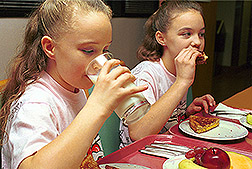This page has been archived and is being provided for reference purposes only. The page is no longer being updated, and therefore, links on the page may be invalid.
|
|
|
|
USDA Children's Nutrition Research Center Celebrates 30th Anniversary
By Alfredo FloresOctober 31, 2008
HOUSTON, Texas, October 31—Officials with the U.S. Department of Agriculture, Baylor College of Medicine and Texas Children's Hospital marked 30 years of cooperative children's nutrition research during a ceremony here today.
Officials from the organizations renewed a long-term agreement at the Children's Nutrition Research Center (CNRC) here to conduct cooperative research on obesity and other issues affecting the health of children in the United States. The Agricultural Research Service (ARS), an intramural scientific research agency of USDA, and Baylor College of Medicine manage CNRC through an agreement that has allowed the center to operate as a cooperatively run research institution.
"Research at CNRC has enabled healthcare providers and policy advisors to make dietary recommendations that improve the health of children in the United States and around the world," said Caird Rexroad, ARS associate administrator for national programs.
Also speaking at the anniversary celebration were USDA Undersecretary for Research, Education and Economics Gale Buchanan, ARS Human Nutrition National Program Leader David Klurfeld, CNRC Director Dennis Bier, CNRC Director Emeritus Buford Nichols, Houston Mayor Bill White, and other scientists at the center.
"The CNRC has helped define the nutrient needs of children, from newborns through adolescents, since its inception three decades ago," Rexroad said. "Its countless research findings through the years have greatly improved the health of today's children, and will continue to do so for generations to come."
CNRC is one of six federally funded human nutrition research centers in the United States and the first multi-disciplinary center to focus exclusively on scientific investigations into the role of maternal, infant and child nutrition in optimal health, development, and growth. Approximately 65 research scientists and 200 support staff work at the facility. CNRC researchers have published more than 3,000 peer-reviewed scientific papers since the center's inception in 1978.
The center includes world-class research instrumentation, including a large, live-in metabolic unit, an energy metabolism laboratory, analytical core laboratories, a body composition laboratory, and an eating behavior observation laboratory.
In recent years, CNRC researchers have helped develop and field-test an innovative program to help prevent obesity among 8- to 10-year-old African-American girls, helped track and understand the factors that contribute to obesity in the nation's Hispanic children and youth, and developed an interactive body-mass index (BMI) computer tool to help parents keep their growing children's weight on track.
They've also helped develop guidelines to help parents determine what's best to feed their infants and toddlers, have shown that serving large portions of energy-dense foods at meals equates to substantial extra calories consumed by U.S. preschoolers, and have shown that mothers who drink milk at mealtimes are more likely to serve their young daughters milk with meals, resulting in a positive impact on the girls' milk consumption, calcium intake and bone health.

